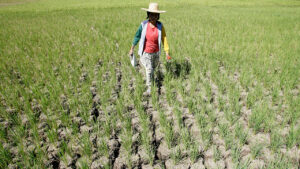
Group advises gov’t to adopt climate-smart practices
By Chloe Mari A. Hufana
THE PHILIPPINE government has been urged to adopt climate-smart practices to mitigate the effects of climate change, which a group said over the weekend would take decades and trillions of pesos worth of funding to address.
Speaking at a media briefing on Sunday, John Leo C. Algo, national coordinator of Aksyon Klima Pilipinas, said the government must take decisive action while committing to sustained efforts over decades to address the deep-seated challenges posed by climate change.
“We need investment in implementing solutions, either for the government, businesses, or society,” he said, explaining how climate-smart practices are strategies, techniques, and actions that adapt to climate change, mitigate their adverse effects and promote sustainable development.
He said these practices typically involve reducing greenhouse gas emissions, enhancing resilience to climate impacts, and ensuring food security, all while minimizing negative environmental and social consequences.
The Department of Environment and Natural Resources Secretary Maria Antonia Yulo-Loyzaga echoed this sentiment in the past, warning that without intervention, climate change could result in substantial economic losses amounting to approximately P1.4 trillion by 2030.
Earlier, she stressed the urgent need for significant investments, estimating a requirement of P3.6 trillion by 2030 to mitigate these adverse effects.
“When we look at the GDP, the needed investments, or the kind of losses and damages our country will experience, those trillions of pesos that we would lose because of climate change, that could have gone to other development projects,” Mr. Algo told BusinessWorld on the sidelines of the same media briefing on Sunday.
He added that the budget could go to other development programs, such as housing, agriculture, or health.
“But instead, because of climate change, it would significantly impact the Philippines’ pursuit of sustainable development,” he added.
By adopting climate-smart practices in the agriculture sector, he said farmers would be educated on resilient farming techniques to safeguard crop yields and ensure food security amidst evolving climatic challenges.
Recent findings from the Department of Agriculture underscore the severity of the situation, with El Niño-induced damages nearing P6 billion, with rice still the most affected crop, absorbing P3.1 billion in losses.
It said MIMAROPA, Cordillera Administrative Region, and Western Visayas are the three most affected regions.
“There’s a strong El Niño and there’s global warming and we’re seeing the same patterns, the same trends from before to now, only now is worse,” he said.
“For people to say that what they’re feeling in their skin right now is worse than eight years ago, even though many factors are the same, indicates that from first-hand experience of many Filipinos, global warming is becoming worse because we are now really feeling it.”



